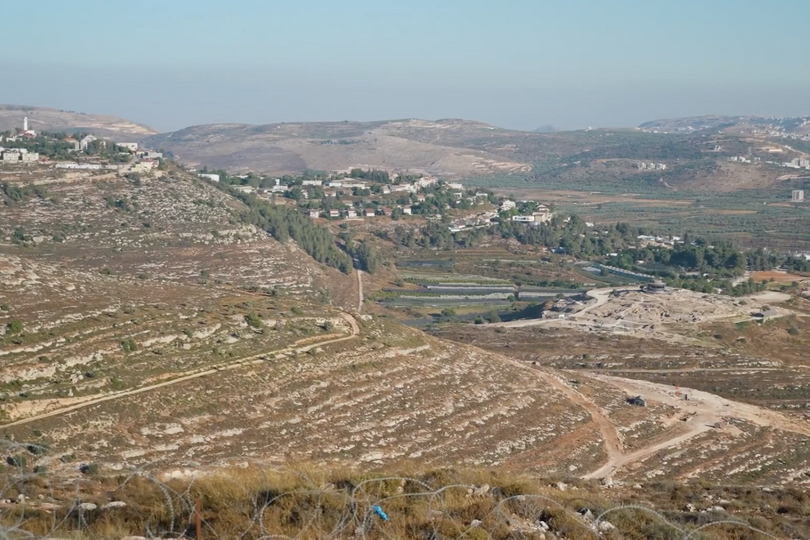The move angered international players, but millions of Israelis believe that reclaiming their biblical inheritance is the right thing to do.
The view from the hilltops of Eli is stunning, and even more so because it overlooks modern and ancient Shiloh (pronounced shee-LOH), the site where the Bible says the Tabernacle and the Ark of the Covenant rested for nearly 4 centuries.
How do they know it's the biblical site?
One resident, Eliana Passentin, the international desk director for the Binyamin Regional Council, likened the Bible's description (in Judges 21:19) to a navigation App (Waze) pinpointing the ancient location.
"It's like using Waze in ancient times tells you exactly how to get to Shiloh. And they said, 'Behold, there is a feast of the Lord from year to year in Shiloh, which is on the north of Beth El (Bethel).' There's a verse at the end of the book: 'On the east side of the highway that goeth up from Beth El to Shechem and on the south of Levona.'"
Passentin lives in Eli, named for the biblical high priest. Her home overlooks Highway 60, which has a history traveling back to the times of the Patriarchs.
"We know where ancient Beth El is. We know where Levona is," Passentin explained. "There's actually an Arab village called Luban, which preserves the ancient biblical name, and Beitin, which is Beth El and the Highway, Highway 60, also known as Derech HaAvot, the highway of the patriarchs, take the zero off the 60, it's Kvish Shesh. It's highway six from ancient times, like the main artery of life."
Abraham, Jacob and Joseph walked this highway.
"Eighty percent of the stories in the Bible in the Old Testament, in our Bible, occurred here at Judea and Samaria in this region. It's amazing everywhere you go, it's ancient biblical history; but we are here because of Shiloh, which is just beneath us," Passentin noted.
The round tower and ancient tel, (a mound or small hill that has been the site of dwellings for centuries) were the site of Israel's tabernacle where the book of 1st Samuel says Hannah cried out to God for a son.
Recalling the history, Passentin said, "It's the story of Israel's first capital, where the tabernacle stood for 369 years. 369 years! This was the center for the twelve tribes. This was the center of Israel, and everything surrounding is, we're all – we're all back here because of that story."
A quarter of a million Israelis live in this area that much of the world considers part of the West Bank. In fact, it's known as the Binyamin Regional Council, named for the biblical inheritance given to the tribe of Benjamin.
Despite the area's deep biblical roots, Israelis here face the constant threat from terrorists who aim to drive them from the land.
Israel Ganz heads the Binyamin Regional council. He believes there are two ways to fight the terrorists: one is militarily, but the best way, according to Ganz, is for more Israelis to make their homes and start their families here.
"Our answer for the terrible terror is deepening our roots, especially when we see (them) trying to attack, we will expand our communities, where we will build more. We will (expand) the roads, the infrastructure, because we (are) here to stay. And if they think they can frighten us, the answer is no. We'll grow up," Ganz said.
Passentin and her husband are raising their eight children here in Eli.
She calls it satisfying. "It's a life with a lot of meaning. With the most beautiful nature and a wonderful warm community. The kids leave their bikes outside; nobody's gonna steal them. And you borrow sugar and milk from your neighbors. And there's, there's a feeling of togetherness, of community."
Eli was established in 1984 and planned as a city built on the hilltops.
"What I love about it is the fact that we're living in the biblical heartland," Passentin explained. "I wake up every morning excited and happy and grateful to God that we're here. And, we have a special story that kind of just evolved."
She has lived on her hilltop for 25 years, 10 of those in a trailer, before they built their home.
"Sometimes we had electricity, sometimes we had no running water," she recalled. "Today we have no WiFi, so people say, you know, forget the water, the electricity – but no WiFi! So that's modern-day pioneering."
"Passentin designed her home to have the shape of a home from ancient Shiloh, and she wanted every window to tell a story.
"When we started the infrastructure for our home, we found hundreds of pottery shards," she said. "We live overlooking the place of the Tabernacle. So, we have broken dishes from Jewish families from 3,500 years ago, all over our backyard."
Passentin says her hopes for the future are generational.
"My dream, she told CBN News, "is that our children grow up understanding and appreciating the privilege they have of living in the biblical heartland."
Originally from the Christian Broadcasting Network
CCD edited and reprinted with permission












